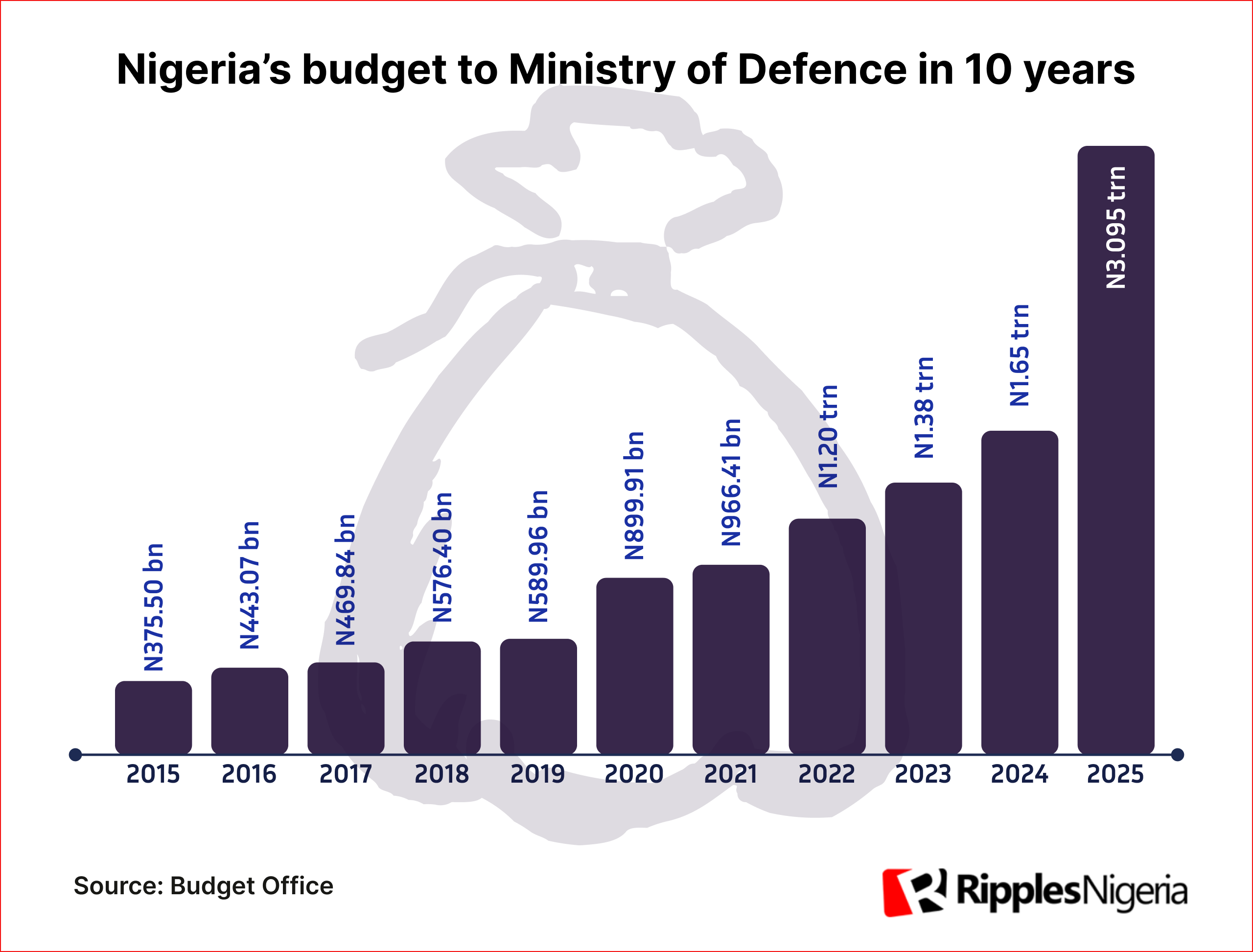Ripples Metrics
RipplesMetrics: As violence soars, Nigeria’s defence budget falls behind

Despite growing insecurity and repeated mass killings across Nigeria, data from the Budget Office of the Federation reveals that the country has consistently allocated less than 10% of its national budget to the defence sector over the last decade.
According to a report by RipplesMetrics, Nigeria’s defence budget as a share of the total national budget has steadily declined, dropping from 8.36% in 2015 to just 5.64% in 2025. While the actual naira allocation has increased in nominal terms — from ₦375 billion in 2015 to a record ₦3.095 trillion in 2025 — the defence sector’s proportionate share has shrunk significantly.
This trend raises questions about the government’s commitment to addressing the country’s spiralling security crisis. Over the past decade, Nigeria has witnessed a disturbing surge in violence, ranging from insurgent attacks in the North East, banditry and kidnappings in the North West, to farmer-herder clashes and communal violence in the Middle Belt and South.
For instance, Ripples Nigeria had continued to track for over six months now since Nigeria’s Chief of Defence Staff (CDS), Maj. Gen. Chris Musa assured Nigerians that notorious bandit kingpin, Bello Turji would either be captured or eliminated by the Nigerian military, but no end has been met.
Just in the past year, mass killings in Plateau, Benue, Zamfara, and Kaduna states have claimed hundreds of lives, with communities left devastated and security forces often overwhelmed or absent. Analysts argue that the budgetary trend reflects a deeper neglect of security sector reform and capacity building.
READ ALSO: NGX: Equities market makes marginal recovery as investors pocket N31bn
Between January and March, the first quarter of 2025, there have been over 3,000 fatalities reported due to insecurity crises in Nigeria and over 2,000 abductions, according to Beacon Security Intel.
The sharpest drop came in the 2024 and 2025 budgets, where despite the defence allocation rising to ₦1.648 trillion and ₦3.095 trillion respectively, the sector’s share of the national budget dipped to 5.73% and 5.64%. This suggests that while overall spending is increasing, defence is not keeping pace with other sectors in budgetary prioritization.
Observers also point to inefficiencies and corruption within the military procurement system, arguing that higher allocations do not always translate to stronger security on the ground. However, many agree that underfunding the sector in a period of national emergency sends the wrong message.
With 2025 shaping up to be another challenging year for national security, calls are growing louder for a comprehensive review of Nigeria’s defence strategy — starting with the budget. Although the 2025 budget saw an increase of over N2 trillion from what was budgeted for the defence sector in 2024.
Very recently, the former Vice-President of Nigeria, Atiku Abubakar criticized the federal government over its handling of the country’s worsening security crisis, describing recent killings and attacks in Plateau State as evidence of a “total collapse” of national security under the present administration.
By: James Odunayo
Join the conversation
Support Ripples Nigeria, hold up solutions journalism
Balanced, fearless journalism driven by data comes at huge financial costs.
As a media platform, we hold leadership accountable and will not trade the right to press freedom and free speech for a piece of cake.
If you like what we do, and are ready to uphold solutions journalism, kindly donate to the Ripples Nigeria cause.
Your support would help to ensure that citizens and institutions continue to have free access to credible and reliable information for societal development.




























